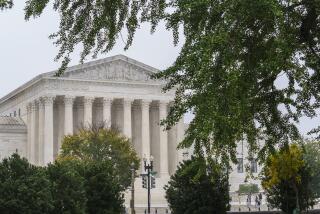Bill of Rights’ scope at issue
- Share via
The Chicago gun case revives one of the fiercest debates in constitutional law: Did the Bill of Rights, including its famous provisions protecting the freedom of speech, the free exercise of religion and the right against “unreasonable searches and seizures,” protect the basic rights of all Americans, or did it only protect them against an overly powerful national government?
In the 19th century, the Bill of Rights was limited to federal laws. The words of the 1st Amendment begin with the phrase, “Congress shall make no law respecting an establishment of religion . . . or abridging the freedom of speech.” Not surprisingly, the Supreme Court in its early years saw these rights as limited in their effect. They did not, for example, prevent Virginia from punishing abolitionists for speaking out against slavery or another state from having an official church.
After the Civil War, the Constitution was amended to put limits on states. The 14th Amendment said, “No state shall . . . abridge the privileges or immunities of citizens of the United States” or deprive them of “liberty” without due process of law.
In a step-by-step fashion from the 1930s to the late 1960s, the Supreme Court ruled that rights such as free speech and freedom against self-incrimination, and protection against “cruel and unusual punishment,” were true rights state and local officials must abide by. In awkward phrasing, those rights were said to be “incorporated” into the “liberty” contained in the 14th Amendment.
Even today, there are exceptions. For example, the 5th Amendment says persons may be charged with a serious crime only by “indictment of Grand Jury.” But that right was not deemed fundamental, so states and counties need not use grand juries to hand down indictments.
-- David G. Savage
More to Read
Sign up for Essential California
The most important California stories and recommendations in your inbox every morning.
You may occasionally receive promotional content from the Los Angeles Times.














